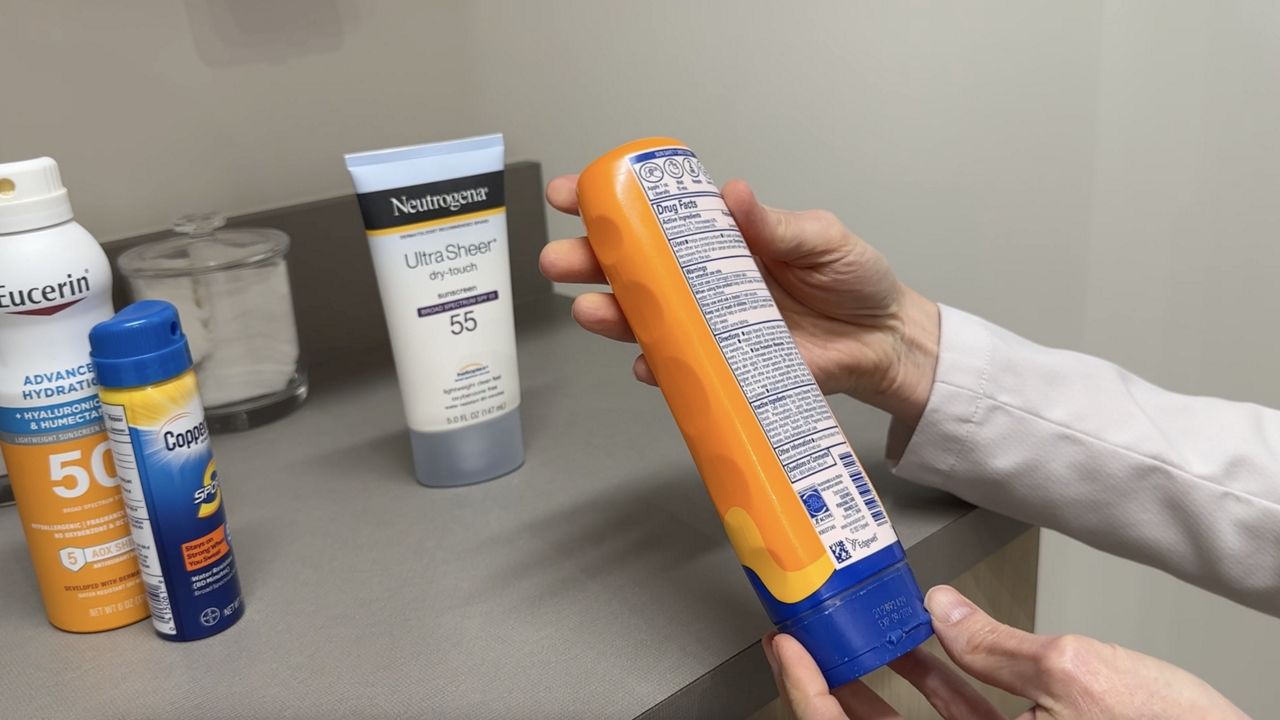CARY, N.C. – Thursday is the first official day of summer and that often means more time spent outside in the sun. Some dermatologists are worried about social media trends urging people to stop using sunscreen.
Recent claims circulating online stem from the idea that sunscreen isn’t necessary. The posts claim sunscreen can block you from getting enough natural exposure to sunlight and that it contains potentially harmful ingredients.
Dr. Shelley Cathcart is a dermatologist at Blue Ridge Dermatology in Cary.
“I graduated from medical school in ’07, so I've been doing it a long time. And I love the skin just because it's the most visible, accessible organ,” Cathcart said.
Cathcart often spends time educating patients about sun protection.
“I always recommend at least a [SPF] 30. And because of sunscreen application errors, I often even say go ahead with a [SPF] 50,” Cathcart said.
She said the effects the sun can have on unprotected skin are facts backed by science.
“We know what a carcinogen the sun is. We know that UV radiation to your skin is going to damage your DNA. It's going to put you at an increased risk of skin cancers,” Cathcart said.
So Cathcart said she wasn’t expecting to see recent viral posts on social media telling people to stop using sunscreen.
“I’m surprised I'm going to have to come to sunscreen’s defense. I mean it's kind of gotten in hot water lately, surprising to me,” Cathcart said. “If anybody's ever missed a spot with their sunscreen, I think you know that it does work. It does deflect the sun's rays.”
Many posts online point to concerning ingredients and Cathcart said that’s understandable given past issues with some products.

“Avobenzone is fine but you can see on the front here it says ‘oxybenzone free’ and that’s one of the ingredients that has been linked potentially to being a hormone disrupter, so a lot of people prefer to avoid those kinds of sunscreens,” Cathcart said.
She also encourages people to wear clothes that cover your skin, as much as you comfortably can, and to spend time in the shade when possible. But even those precautions aren’t 100% effective.
“Seeking shade is often not enough. An SPF of about seven is what you can expect from a just a beach umbrella. So there's a lot of reflected sun. If you're out in it, you're still getting sun. It's better than nothing. I certainly do encourage my patients to seek shade, but it's not the whole story,” Cathcart said.
Cathcart also encourages people to use sun-protective clothing like hats and long-sleeved rash guards, in addition to seeking shade.
“Because sunscreens are not perfect products, they're not the whole story,” Cathcart said. “That's the thing, you can't miss apply [clothing]. You can't forget to reapply it. You know, clothing is so easy.”
Cathcart said people shouldn’t just stop using sunscreen, adding that like most things, it’s important to read the fine print.
“There have been some safety things that have come out in the past few years that do need to be addressed and paid attention to. So it's not without cause. We do need to pay attention to what we're putting on our bodies,” Cathcart said. “You do want to get some protection from sun, from UV radiation and from potential damage over time. Because I can tell you, I take off skin cancers from sun exposed skin all day and you don't want that complication at all.”
Cathcart also said lotion sunscreens are more effective.
If you do use spray sunscreen, make sure to rub it in, she said.
“I wish the sprays were good solutions, I really do, because they are so easy and I think we get a lot of better buy-in from patients about the sprays because they do feel easier. They feel better,” Cathcart said. “I really encourage people, at least for their first application, to do a lotion sunscreen because you know you're getting a better coverage, you're getting a thicker layer.”
Finally, make sure to reapply sunscreen at least every two hours.
Cathcart said another common misconception is that people with darker skin tones don’t need to use sunscreen. She said it’s true that some skin cancers are not as common among people with darker skin tones, but she adds that everyone can benefit from sun protection.
Related article: Dangerous heat likely this weekend



